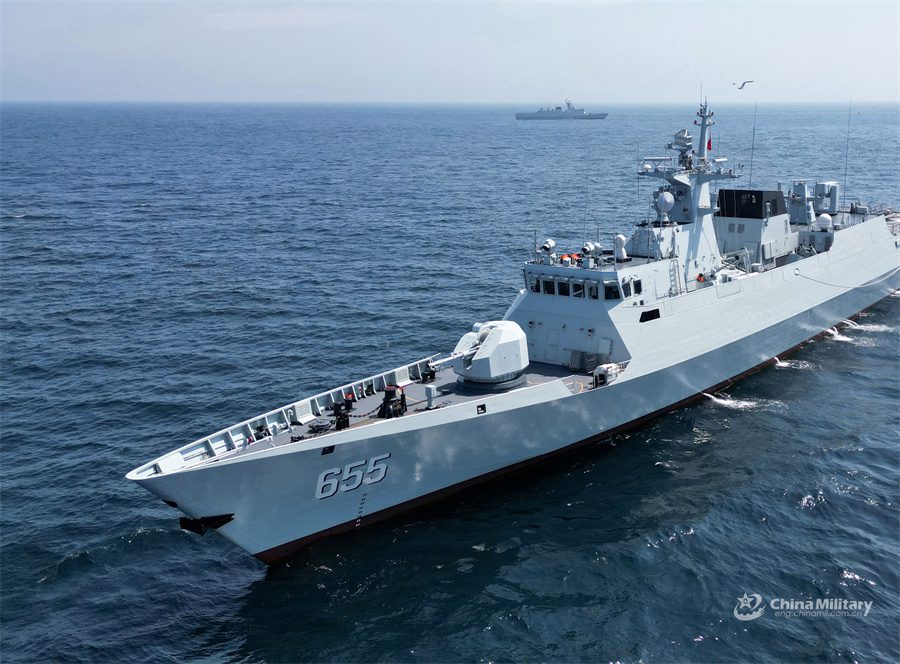The Economist takes look at China's global dilemma with a
particular emphasis on the Middle East:
----------
Does China welcome—or dread—an Iran-Israel war?
It wants American interests to suffer, but not at any price
Last month, as tensions escalated between
Iran and Israel, China helped organise a Chinese film festival in the Iranian capital, Tehran. It opened with a blockbuster: “The Battle at Lake Changjin”. The drama portrays the heroism of Chinese soldiers who fought against American troops in the Korean war of 1950-53. “Strike one punch to avoid a hundred,” Mao Zedong is shown exhorting his colleagues. Nationalist bloggers in China crowed about the film’s showing. “Iran cannot sit idly by, even if the United States is behind Israel!” wrote a widely read scribe.
As Chinese officials ponder the
violence in the Middle East since then, they may be less keen on escalation. Iran fired a
barrage of missiles at Israel on October 1st. Israel has
relentlessly attacked Iran’s proxies in Gaza and Lebanon. All of that unsettles China, which is by far the most powerful of four countries—also including Iran, North Korea and Russia—that have acquired monikers in the West such as the “axis of upheaval” and the “quartet of chaos”.
[I call them the CRINKs 

 &
&  ]
] The four share a contempt for the American-led global order and a readiness to disrupt it. Their security-related dealings with one another are often shadowy. But, notwithstanding its own muscle-flexing around Taiwan (see next story), there are limits to China’s appetite for conflict.
China’s relationship with Iran illustrates its dilemma. Leaders in Beijing have a lot of sympathy with Iran’s worldview. Last year it was given full membership of the Shanghai Co-operation Organisation, a Eurasian security and economic club dominated by China and Russia. In January Iran was admitted to the
brics, another group that China and Russia are trying to nurture as a bastion of West-sceptics.
China also benefits from Iran’s abundant supply of oil. The volume of this trade is hard to quantify because of the
elaborate schemes that China and Iran use to evade American sanctions. But estimates put it at 10-15% of China’s crude imports. That is most of Iran’s exports of the fuel.
As the world’s biggest buyer of foreign oil, China worries about the potential impact of a wider war in the Middle East on the flow and cost of the stuff. Iran sells its oil cheap. An Israeli strike on Iranian oil facilities could force China to depend more on other, pricier suppliers such as Saudi Arabia. But Saudi shipments could be disrupted in the Strait of Hormuz or the Red Sea by missile strikes from Iran or the Iranian-backed Houthis in Yemen.
This may not be disastrous for China. It is thought to have reserves that would cover three or four months of lost imports. And oil accounts for 18% of China’s energy supply, compared with 34% in America. But a big war could also threaten China’s commercial interests in the Middle East. It has poured billions of dollars into energy and infrastructure projects, especially in Gulf countries such as Saudi Arabia and the United Arab Emirates. Israel, too, is a recipient of Chinese investment (despite China’s support for the Palestinian cause).
China sees American power waning in the Middle East, and senses an opportunity. It has forged close ties with Iran, but also with Saudi Arabia and Iran’s other rivals. China describes its big investments in the region as part of its Belt and Road Initiative (bri), a global infrastructure-building scheme aimed at boosting trade and Chinese clout. The bri’s politics-blind approach helps to cast China as a non-meddling power. It is eager to foster that image in the global south, which it views as a counterweight to America.
But as the Middle East threatens to descend into ever wider conflict, with Iran—a prominent Chinese friend—at the centre of it, China’s diplomatic impotence in the region risks being exposed. It has been trying to demonstrate otherwise. In March last year it brokered the final stages of a deal between Iran and Saudi Arabia to restore their long-severed diplomatic relations. In July the rival Palestinian factions, Fatah and Hamas, announced a vague agreement in Beijing to co-operate in forming a new government for Palestinians when the war in Gaza ends.
These moves have done nothing to stop the violence, however. Israel rejected the “Beijing Declaration”—it wants no role for Hamas in the Palestinian territories. Iran’s dependence on China as a buyer of its oil would appear to give China leverage over the Islamic Republic. But China apparently sees greater dividends from America’s embroilment in Middle Eastern conflict than from trying to keep Iran in check. An America distracted by wars in Ukraine and the Middle East, China may reckon, would have less appetite for confronting China over Taiwan or the South China Sea.
That does not mean that China is eager to fan the flames. The security ties between it and Iran are limited. A report published this month by the Carnegie Endowment for International Peace, a think-tank in Washington, notes “rumoured” Chinese provision of satellite technology for Iran’s ballistic-missile programme. But an agreement signed in 2021 has produced little in the way of military co-operation, apart from some joint drills that Western intelligence analysts deem largely insignificant. And though the deal reportedly dangled the possibility of $400bn in Chinese investment over 25 years, China shows no eagerness to pour money into Iran.
To China, the two other members of the quartet are more vital concerns. Russia and North Korea both border China and act as buffers against encroachment by American power. But even with these countries, China does not offer carte blanche. It gives massive technological support to Russia’s defence industries, while appearing to stop short of providing weapons for use against Ukraine (despite a partnership with Russia that they both describe as having “no limits”). China has made clear its opposition to Russia’s threatened use of nuclear weapons in that conflict.
With regard to North Korea, China did not stop it from acquiring nukes, but it was clearly angered by the move. It may have also taken a dim view of the agreement, which looks a lot like a defence treaty, that North Korea and Russia signed in June. With Russia in the mix, China risks losing some of its influence over North Korea.
China sees all of its authoritarian friends as useful for discomforting America. But it also treats them with caution, showing a smaller appetite for risk than other members of the quartet. In the Middle East, it does not want to become enmeshed in a complex struggle. If things really kick off between Israel and Iran, leaders in Beijing are likely to stand back and watch, with fingers crossed that China’s interests survive the crossfire. ■
----------
I think this is pretty much spot on.










